The Checker Maven
The World's Most Widely Read Checkers and Draughts Publication
Bob Newell, Editor-in-Chief
Published every Saturday morning in Honolulu, Hawai`i
Noticing missing images? An explanation is here.
Surprise, Surprise

The fellow in the photo above is obviously studying checkers and has just come across the problem that forms the subject of today's Checker School column. The solution to the problem is one that we too found surprising, and we'll bet you'll feel the same way.
Here's the position:

WHITE
White to Play and Win
W:WK30,22,16,K2:B21,14,13,K10.
In a game in which White had and lost the advantage several times, we've arrived at a position where White has one last chance to bring it home. Can you find the surprise move that leads to White victory, or will you be surprised that your solution wasn't the correct one? Try the problem, and then get one last surprise by clicking the mouse on Read More to see the solution, a sample game, and detailed notes.![]()
Wyllie's Waterloo
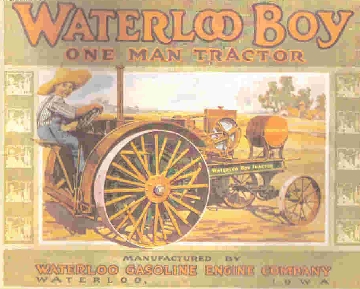
Surely you were expecting us to have chosen a dramatic image of the famed Battle of Waterloo, but we like to keep our readers guessing, and we came up instead with a Waterloo tractor made in Waterloo, Iowa, one hundred and one years after Napoleon's defeat on June 18, 1815. The young lad on the tractor perhaps played checkers in his leisure time, and we hope he did well and didn't meet his own Waterloo over the board. But we can surely excuse him if he did, for even the checker greats had their own bad days. Willie Ryan, in his book Tricks Traps & Shots of the Checkerboard, tells us about a bad day that one of the greatest of all, James Wyllie, endured.
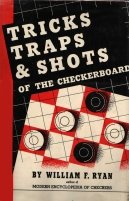
"It is sheer fallacy to believe that when James Wyllie ruled the boards 80 years ago, he had no worthy contemporaries. On the contrary, Wyllie lived and competed in an era that produced most of the game's outstanding players and personalities, including Andrew Anderson, John Drummond, Robert Martins, John Robertson, Henry Spayth, and Robert D. Yates, to name just a few. Wyllie's predominant fame and popularity stemmed from his prolific activities, his inimitable wit, and his fearlessness as a champion. While others were vainly striving to defend reputations they did not have, jocular James took them all on, in good season and bad, acquitting himself on all occasions with admirable poise. The "Herd Laddie" had his bad innings at the board, as indicated by this reverse at the hands of Robert McCulloch, of Glasgow, best known for his revised publication of McCulloch's Edition of Anderson's Guide. The game proceeded as follows:
| 11-15 | 25-22---B,1 | 9-14 |
| 24-20 | 18-25 | 28-24---3 |
| 8-11 | 29-22 | 5-9 |
| 28-24 | 7-11 | 26-23 |
| 4-8 | 30-25 | 9-13 |
| 23-19 | 2-7 | 31-26---4 |
| 15-18 | 19-15---2 | 7-11---5 |
| 22-15 | 11-18 | 26-22---C, |
| 11-18 | 22-15 | to the posi- |
| 32-28---A | 14-18 | tion in the |
| 10-14 | 24-19 | diagram. |
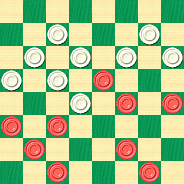
BLACK
Black to Play and Win
B:W27,25,24,23,22,21,20,19,15:B18,14,13,12,11,8,6,3,1.
A---Wyllie's favorite line of the Ayrshire Lassie, and one that lends itself to a wide variety of "soupy" formations.
B---26-23 is equally good. Charles Hefter of Kankakee, Illinois, is the distinguished author of the following coup on that line: 26-23, 9-13, 19-15, 7-11, 31-26, 3-7, 24-19, 5-9, 26-22,1-5, 28-24, 7-10, and now comes the cut-up by 20-16, 11-20, 15-11, 8-15, 21-17, 14-21, 23-7, 2-11, 19-1, 9-14, 22-17, 13-22, 25-9, 5-14, 1-6, 11-16, 6-10, 14-18, 10-14, 18-23, leading to a draw.
C---This is where Wyllie went wild. The game had been adroitly contested by both players to this point. Wyllie could have drawn easily here, by 15-10, 6-15, 19-10, 13-17, 23-19, 11-15, 20-16, 3-7*, 10-3, 1-5, 19-10, 12-28, 3-12, 28-32, 27-24, 32-27, 10-6, 27-20, 6-1, 20-24, 1-6, 24-27, 6-9, 18-23, 26-19, 27-24, 9-18, 24-29. Wm. F. Ryan."
1---Despite the natural look of this move, the computer scores 25-22 as not so good for Black, giving White a definite edge---Ed..
2---27-23 is preferred here---Ed.
3---This move is a probable loss. 20-16 might have kept White in the game, but Black is still strong---Ed.
4---White is now completely lost. Better was 31-26 though the situation remains bad---Ed.
5---This very bad move allows a draw. A winning line for Black might have been 13-17 15-10 6x15 19x10 8-11 24-19 18. 17-22! 26x17 11-15 27-24 18x27 20-16 27-3 17-13 3-8!10x3 31-27 19x10 27x11 25-22 11-7 22-17 7-2 13-9 14-18 17-14 18-23 21-17 23-27 9-5 2-7 17-13 27-31 13-9 7-2 Black Wins. White is completely out of safe moves---Ed.
Will you meet your own Waterloo here? Willie seemed to have a mini-Waterloo of his own in not catching the blunder pointed out at note 5 above. Battle the problem and then march your mouse to Read More to see the solution.![]()
A February Short

Even though this is a leap year, February remains as always the shortest month of the year. It's something to be grateful for in wintry North American climes, as this abbreviated month brings us that much closer to spring.
Today's problem is also "short" in that it is a miniature, those minimalist problems that focus our attention and often demand great accuracy and skill. Like their exact opposites, the stroke problem, they are not to everyone's taste, but unlike stroke problems, miniatures are eminently practical in nature.
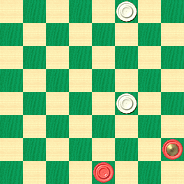
BLACK
Black to Play and Win
B:W30,14:BK5,2.
Don't give this problem short shrift; put it on your short list. After you've solved it, make a short click on Read More to see the solution.![]()
Pretty Tough

As we've noted a number of times, The Checker Maven tries to provide a variety of problems: some easy, some hard, some in-between. Today's problem, a study by celebrated problemist L. T. de Bearn, is, like the cut of meat shown above, definitely on the "tough" side. While obviously appealing to the skilled player looking for a challenge, intermediate players and even ambitious beginning players can benefit by doing some analysis and carefully playing through the solution.
So, without further ado, here's the position.
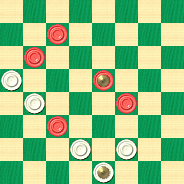
WHITE
White to Play and Draw
W:W13,17,26,27,K31:B6,9,K15,19,22.
Forces are even but White has a pretty serious mobility issue, and in checkers that can spell doom. But there is a way to a draw. Are you tough enough to find it, or will this problem chew you up? Get your teeth into this one, and then bite your mouse down on Read More to see the solution.![]()
What Is Checkers?

Based on the photo above, we suppose our column's title should have been "What are Checkers?" as a plural subject requires a plural verb. But of course, the intended meaning of the phrase references "checkers" as a game, in the singular, and so the singular verb is correct after all.
Although we could go on at length about syntax and other matters grammatical, we're sure you didn't come here for a language lesson. In fact, it's time for an installment of Checker School, and while good grammar and usage are highly recommended, good checker moves are what we're really after.
Today we have an interesting position which is not particularly easy to solve; in fact Ben Boland himself went wrong when he published it in Famous Positions in the Game of Checkers.
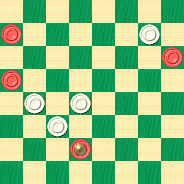
WHITE
White to Play and Draw
W:W8,17,18,22:B5,12,13,K26.
Mr. Boland's premise is correct; the game can be drawn by White, even though the position looks anything but favorable. Can you find the correct "checker usage" that leads to a draw? Or will you be sentenced to fail? Don't worry; you won't get graded on your answer, and you can always click on Read More to see the solution, notes, a sample game, and the reason why today's column is titled What is Checkers?.![]()
Checker Problem Composition Contest
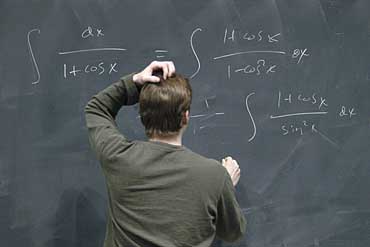
Veteran player and problem composer Bill Salot is sponsoring the second in a series of checker problem composition contests. The first competition produced a pair of very fine problems. You can get all the details of the new contest and a look at the entries in the previous contest here.
You're sure to enjoy these elegantly-crafted problems, but why not make a try at it in your own right? If you don't know where to begin, take a look at some of your own games; surely in one or more of them, either you or your opponent made some nice play that could well be the basis of a problem. It's an entertaining exercise and a great way to learn more about checkers.
We congratulate Mr. Salot on his efforts in promoting the art of checker problem composition.![]()
"Read More" Once More

We have been experiencing ongoing database problems and "Read More" links were out of service this morning. We've fixed this and apologize for the inconvenience.
Our long-term solution is a complete rebuild of our database. That's in progress but it's a big job. In the meanwhile, please bear with us and do let us know if something isn't quite right.![]()
Reed's Delayed Brooklyn

The Brooklyn Bridge is certainly a New York City icon, famed in poem, song, and urban legend. You probably are wondering about our title, which contains the words "Delayed Brooklyn"; more typical for New York would be "Brooklyn Delay" as many a rush-hour traffic jam plays itself out every week, if not every day, on the Brooklyn Bridge.
But in today's installment from the classic Willie Ryan book Tricks Traps & Shots of the Checkerboard we'll find out just what "Reed's Delayed Brooklyn" is all about. Let's hear it in Willie's own words.

"The following brilliant crossboard game was contested by James P. Reed and Alfred Jordan when Reed visited the British Isles many years ago to do battle with the leading boardsmen in John Bull's domain. When the diagrammed situation was reached, Jordan continued 21-17 and had to give up soon thereafter. When the game was over, the brilliant Pittsburgher astonished Jordan, as well as the gallery, by pointing out how Jordan could have drawn by a delayed form of the Brooklyn shot. We consider this one of the finest and most deceptive examples of the Brooklyn in embryo:
| 11-15 | 5-9 | 7-11 |
| 22-18 | 18-14 | 22-18 |
| 15-22 | 9-18 | 11-16---B |
| 25-18 | 22-15 | 27-23 |
| 12-16 | 10-19 | 3-7 |
| 29-25 | 24-15 | 26-22 |
| 9-13 | 8-12 | 7-10---C. |
| 26-22---A | 23-19 | Diagram. |
| 16-20 | 4-8 | |
| 30-26 | 25-22 |

WHITE
White to Play and Draw
W:W32,31,28,23,22,21,19,18,15:B20,16,13,12,10,8,6,2,1.
A---If you still think it can't happen to you, look at these figures showing how the great William Strickland, blindfolded, polished off a victim while playing six opponents simultaneously! Continue at A: 25-22,16-20, 24-19, 5-9, 28-24, 8-11, 32-28---1, 4-8, 19-15óB, 10-19, 23-16, 6-10, 26-23, 1-5, 30-26, 9-14, 18-9, 5-14, 22-18^ 14-17, 21-14, 10-17, 26-22, 17-26, 31-22, 8-12, 23-19; then the finish, with: 3-8*, 18-14, 7-10*, 14-7, 11-15*, 19-10, 12-19, 24-15, 2-25, and black wins.
B---The loser. From here to the end, Strickland kept his win well in hand, never giving his opponent a chance to draw. The correct play for a draw at B is 30-25, 10-14, 18-15, 11-18, 22-15, 1-5, 15-10, 6-15, 19-10, 14-18, 23-14, 9-18, 26-22, 7-14, 22-15, 2-6, 24-19, 14-18, 27-24, 20-27, 31-24, 6-9, 15-11, 8-15, 19-10, 9-14, 10-6, 13-17, 6-2,17-22, 2-6, 22-29, 6-10, 5-9, 10-17, 9-13,17-14, 18-22, 14-17, 22-26, 17-22, 26-30, 24-19, 30-25, 22-26, 25-22, etc. F. Tescheleit vs. J. M. Dallas.
C---This is where Jordan fell. One would never suspect that white had a Brooklyn in the offing. At the time this game was played, Jordan was champion of England, and the fact that he missed a draw by 31-27 proves how games may be drawn by stroke strategy that otherwise would be hopeless. In short, Jordan missed the Brooklyn idea and lost the game."
1---30-25 is perhaps a better move here---Ed.
2---This move is fine, but 6-9 would have been at least as good---Ed.
Can you find the solution, or will your resolution be delayed? When you're ready, cross over the bridge to Read More to see the snappy solution.![]()
The Speed of Winter

In continental North America, it seems that one day we're at a picnic and the next day we're buried in snow. Winter can come on fast and catch us by surprise; winter seems to have its own chilling speed.
It will be January when this column appears and no doubt there will be more than enough snow to go around in many locales. But wherever you may be, whether snowy and cold or warm and sunny (we highly recommend Hawai`i in January), you're sure to enjoy a checkers speed problem that is easier than most. Click on the link below to display the problem and start the clock. We think you can solve this one in five seconds, so that's all you're going to get! When you've got the answer, click on Read More to verify your solution.
January Speed Problem (Easy, five seconds)
![]()
Software Upgrade

Between January 2 and January 6, 2012, The Checker Maven site will be doing a major software update. While we anticipate only minimal downtime, things do happen and we ask for your patience and understanding if the site does happen to experience a longer than anticipated outage.
Followup: As of January 3, 2012, the update has been completed. Please do let us know if there is anything that doesn't seem to work correctly.![]()
The Checker Maven is produced at editorial offices in Honolulu, Hawai`i, as a completely non-commercial public service from which no profit is obtained or sought. Original material is Copyright © 2004-2025 Avi Gobbler Publishing. Other material is public domain, as attributed, or licensed under Creative Commons. Information presented on this site is offered as-is, at no cost, and bears no express or implied warranty as to accuracy or usability. You agree that you use such information entirely at your own risk. No liabilities of any kind under any legal theory whatsoever are accepted. The Checker Maven is dedicated to the memory of Mr. Bob Newell, Sr.

